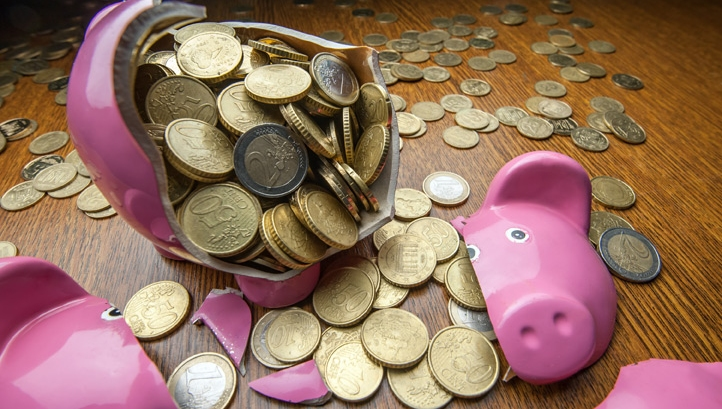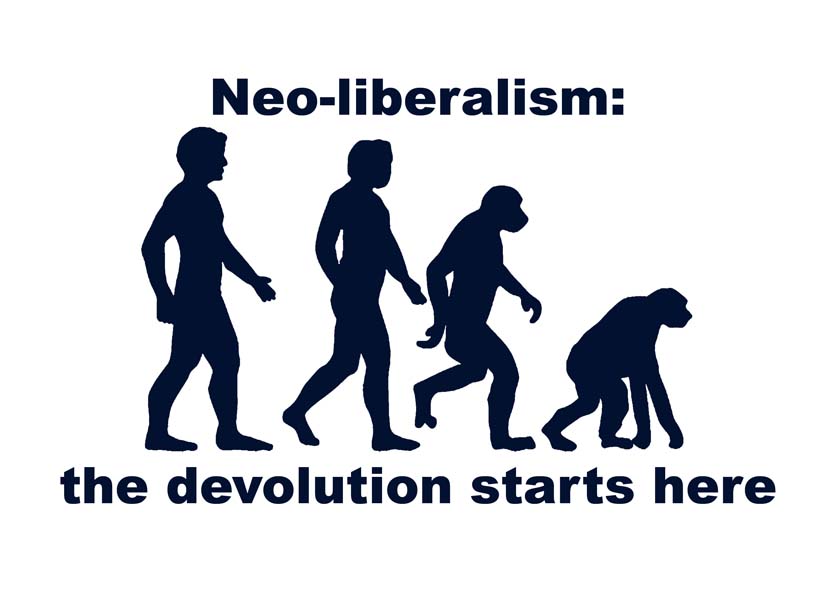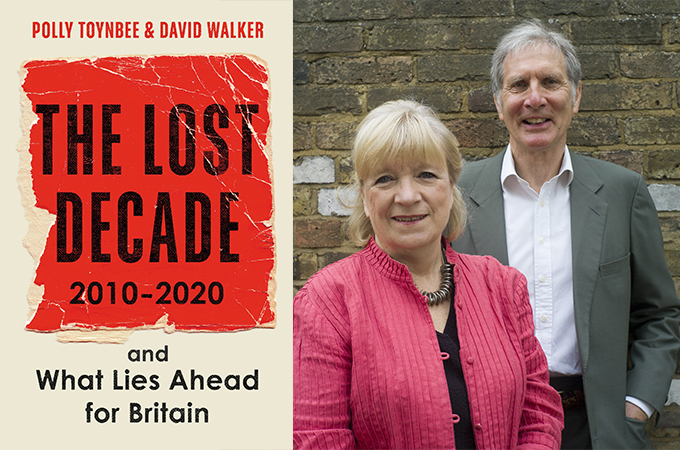The Lost Decade: The Hidden Story of How Austerity Broke Britain*
‘Between 2010 and 2020, Conservative cuts destroyed the fabric of society as we know it. Speaking to people on the frontline reveals the ways our lives have been changed forever...’
*The latest on inhumanity of Austerity(March 2024): Austerity doesn’t just damage public services, it destroys faith in the future

Poverty envoy says callous policies driven by political desire for social re-engineering.
‘The UK government has inflicted “great misery” on its people with “punitive, mean-spirited, and often callous” austerity policies driven by a political desire to undertake social re-engineering rather than economic necessity, the United Nations poverty envoy has found.’
‘The outcome of austerity policies in Britain and elsewhere has become painfully clear: increased child poverty and social misery; declining life expectancy; an increase in racial inequality; decaying public schools and public health and other public services; and all-around catastrophe for disabled people.’ More on these a bit later.
First, Lest We Forget
Nearly nine years ago, in May 2011, I shared the following in an email with our GCGI Friends, which I believe must be remembered again, its words and sentiments,feelings and emotions, more true today, than the day they I wrote them:
The Broken Economic Model*
(First published as an email to the GCGI members in May 2011)

Photo:edie.net
“Do you remember that Margaret Thatcher, the so-called Iron Lady!! She told the Brits that she was going to put the “Great” back into the “Great” Britain. Do you remember? Then, she told us this can only happen if we accept and implement the “Washington Consensus”, the so-called dreaded neo-liberalism. She told us that there was no alternative. She told us we will all prosper and develop more fairly and equitably. She won election after elections. Everything was privatised, deregulated, self-regulated. Industry, manufacturing, (the real economy) was destroyed. Instead, the banks and the bankers were encouraged to rule the world. The economists with no principles and values were “bought” and the business schools, such as Harvard and Columbia were showered with money to act as “Cheer Leaders” for the dreaded neo-liberalism (see the Inside Job for evidence). Communities were dis-mantled and dis-organised. We were told that there is nothing as a society and community. We are all in it just for ourselves, we were told. Destructive competition at the expense of life-enhancing cooperation, collaboration and dialogue was greatly prompted. We were told to say no to love, kindness, generosity, sympathy and empathy and say yes to selfishness, individualism and narcissism, as these values will fire the engine of capitalism and wealth creation! In short, the hell with the common good, we were encouraged to believe.
We were brained-washed. Our other Prime Ministers repeated her nonsense and have carried on her footsteps. It is now over 30 years since the neo-liberalism experiment in Britain. Are we any “Greater” than we were in 1979? Are we any fairer or more equitable? The country is nearly bankrupt, with public and private debt at unprecedented levels, with greatest levels of poverty and wealth disparity ever. The house of neo-liberal capitalism is now at its nadir of decadence.”
You see, all those interested in life’s bigger picture, have been saying the same, over and over. The neo-liberals are not in touch with humanity. They will prostitute all in the interest of profit maximization, cost minimization, highest return to the shareholders, and the biggest and juiciest bonuses for the CEOs and their lackeys.”
Continue to read and discover more on the Broken Economic Model and the ‘Killing’ Ideology of Neoliberalism:

Photo:redandsky.blogspot.co.uk
People’s Tragedy: Neoliberal Legacy of Thatcher and Reagan
The Destruction of our World and the lies of Milton Friedman
Economic Growth: The Index of Misery
Britain today and the Bankruptcy of Ideas, Vision and Values-less Education
Recession, Austerity, Mental, Emotional and Physical Illness
Lest We Forget: The Dark side of Austerity
Life, death and economics: Austerity is a killer
Neoliberalism and the rise in global loneliness, depression and suicide
Austerity driven Homeless children put up in Shipping Containers in ‘Great Britain’
Austerity and its Consequences: No Hope for the Youth
Neoliberalism destroys human potential and devastates values-led education
The scar on the conscience of Britain: The neglect of its children, youth, students and more
Child Poverty UK: The Shaming of the British Elites
Bastard Economics of Greedy Neoliberalism and the Killings of the Innocents in London Tower
Dear Prime Minister-Britain needs a New Economic Model
And now, reverting to: The lost decade: the hidden story of how austerity broke Britain

Photo:bathfestivals.org.uk
‘What happened in the UK between 2010 and 2020 will scar us for the rest of our lives. David Cameron’s Conservatives, only just victorious in the 2010 election, sold austerity as a necessary response to the 2008 financial crash. The exact social consequences of these cuts were spelled out last week in Michael Marmot’s report for the Institute of Health Equity: for the first time in a century, life expectancy has stopped growing and for women in poor areas actually fallen.
We should never stop reminding ourselves just what an astonishing decade we have lived through. In the aftermath of the crash, employment climbed and stayed remarkably high. But these new jobs paid badly and it took until two months ago for earnings to reach where they were before 2008. It is no surprise that debt is mountainous: each household owes on average £15,385, not counting their mortgages. The gap between rich and poor has widened; the young are now worse off than their parents at their age; home ownership has declined steeply – families are stuck in life-long and precarious private renting.
In our 2010 book The Verdict, we evaluated the Blair-Brown era, years of marked social progress. For a new investigation, to assess the extent of the past decade’s damage, we went back to the people we talked to then to see how they have fared since and the hidden ways that austerity has affected their lives.
We followed the fortunes of Emma Percy, in Folkestone, Kent. With her husband, Rob, and three children, the family moved from one rented home to another, changing the children’s schools as rents rose, roofs leaked. They were sometimes living without a functioning boiler all winter long. They were the “just about managing”. Theresa May never got round to helping. Emma and Rob did all the striving and aspiring the prime minister had called for, hoping to save for a deposit, but never quite making enough. In the summer, the only holiday they could afford was camping in the grounds of the school where Rob was caretaker. Their parents own homes; they may never.
Decades take shape in the rearview mirror. Even as the past decade was unfolding, people were aware times were out of joint, an unprecedented number telling a Hansard Society survey at the end of 2018 that the UK was in decline. Everyone saw that pressing national tasks were neglected, as carbon cuts and affordable housing targets were missed, as transport worsened along with education and productivity. Instead, massive efforts were diverted into ideological futility. On the whims of ministers, probation was broken apart, forensic services wrecked and enormous effort wasted on pushing England’s schools out of public control into semi-private academies and trusts, in evidence-free reorganisations.
People expect someone to monitor air and water quality, inspect restaurants and food standards. But the environmental health officers we visited in Huntingdon, Cambridgeshire, were inspecting fewer kebab shops and closing air-monitoring stations despite more pollution. We were there on an inspection when they found a stack of meat pies on the dirty floor of a roadside cafe: the officer told us they register fewer food outlets as high risk, for lack of staff to check them. Nationally, one in 10 takeaways now score zero or one for hygiene and safety. Andy Birks, a butcher in Rotherham in South Yorkshire, told us he hadn’t seen a health inspector in years. “I don’t think there are any left,” he said. Like so many high-street shops, his business had declined in the decade since we first met him, his profits down since 2010.
The Food Standards Agency tests 58% fewer samples and the National Audit Office (NAO) says local authorities are “failing to meet their legal responsibilities”, with staff numbers cut by 45%. Checks that establish if food is safe and contains what it says – not horse meat – were few and far between: the NAO found only 37% of food checks scheduled actually took place. Time and again, in one field after another, we found the covert fraying of the fabric of a civilisation we take for granted.
A Friday night in the control room with Bedfordshire police told the same story of services stretched to breaking point. Mental health and domestic violence dominated the calls. A neighbour reported a man next door banging on his wife’s window, threatening violence. A man called as he chased his son across a dark park, terrified he might harm himself. The chief constable, Jon Boutcher, had just written to his MP recounting a typical night of rapes, stabbings and a lethal traffic accident involving young children. “I run out of officers regularly for 999 calls,” he said.
Meanwhile, the UK got older, with no plan for the decade’s 25% rise in those aged over 65. Social care was a can kicked down the road; as a result, 1.5 million frail old people get no care at all: at the end of the decade, the Johnson government’s response was to deny visas to care staff from abroad, as they earn too little to reach a new £25,600 threshold.
In Hastings, East Sussex, we watched the closure of another day centre, the building sold by the cash-strapped council. This was the seventh of these havens for older adults to close in the town since 2010. As packing cases were being filled with pictures from the walls, we talked to Rose, Mary and Sal, old friends sitting together as they always did, but now for the last time.
Home alone, the statistics showed that many more would arrive in A&E malnourished or dehydrated. That is the constant perversity of austerity; scrimping a bit now to cost more later.
Everywhere, we found a sense of common belonging diminished, with fewer meeting places, playing fields sold off, museums and libraries closed. As the public realm shrank, so did social capital, found the ONS, with less trust and neighbours not talking to one another. Pub closures – premises were down from 52,500 in 2001 to 38,000 by 2020 – were another loss of sociability.
Cameron’s “big society” gimmick delivered a smaller one, as people donated less to charities and volunteering declined. Foreign journalists filmed the Britain of food banks, the homeless, payday loans, bedroom tax and zero-hours jobs. The Conservatives’ pitch in 2010 had been repairing “broken Britain”, but its cracks were widened by an austerity that was neither necessary nor inevitable but resulted from ideological choices. The cap on housing benefit created socially segregated no-go areas for low earners. Councils lost a third of their spending power: buses, planning, housing, youth services and sports facilities were cut or sold off. Nature suffered: Natural England, custodian of flora and fauna in national parks, lost half its budget and shed 1,000 inspectors. Eleven million trees were promised, 1.4m planted.
One service always in the public eye was the NHS. But its 2010 training cuts left it short of 100,000 nurses and doctors. Spending time with the chief executive of Ipswich hospital, we watched as he begged a senior nurse not to leave. Jenny (not her real name), one of his best, brightest and most dedicated nurses, had turned around his difficult chemotherapy ward, caring for seriously ill people feeling at their worst, where deaths of patients exacted a heavy emotional toll on staff. But, taking a deep breath, she told him: “I just can’t keep going.” She would join the nursing bank for occasional shifts, but her departure would add to the 41,000 nurse vacancies. Her team cried when she told them.
The public realm now employs a smaller proportion of the workforce than at any time since 1945. For every £100 for public services in 2010, only £86 in real terms was spent in 2020. Rebuilding schools and hospitals stopped dead. A quarter of local government jobs vanished, with youth workers tackling knife crime the first to go. Criminal justice was hard hit: courts closed; prisons overflowed with violence and drug abuse rife; legal aid was pared to nothing. The armed forces were not spared. Grants to arts organisations fell by a third, funding for national galleries and museums by a half.
It is a perverse society that chooses to harm its youngest most, but years of frozen benefits left families thousands of pounds short, while the old saw their triple-locked pensions rise. State spending per child fell from £11,300 to £10,000. Early intervention for families was so scarce that the numbers of children in care rose fast. Psychiatrists estimated that one in five girls and young women had cut, burned or poisoned themselves in deliberate acts of self-harm on a rising trend: waiting lists for help stretched to a year in some places. Children deprived at school of art, music and drama teaching have lost that chance for ever, with only half taking any arts exams, and trips out severely cut. In 2018, 130 libraries shut and 760 youth clubs closed. This year begins with a million lost young people classified as “Neet”; not in employment or education.
Child poverty soared to its highest level since before the second world war. Infant mortality rose for the first time in two generations. The Thomas Coram Research Institute collected children’s own accounts: “I was so hungry, it was like I got hit in my belly, like I got stabbed with a knife,” 14-year-old Emmanuel told it. The threshold for claiming free school meals halved. More than 2,000 food banks opened, four times more in districts where universal credit – one of the decade’s greatest, but by no means only, disasters – was rolled out. Ministers’ talk of “scroungers” hardened public hearts. In Knowsley, on Merseyside, a food bank organiser collecting donations was asked: “Is this for English people?” He replied: “It’s for hungry people.”
Of course, these years were not monochrome. Plenty of good happened because people are admirably resilient: we found enterprise, generosity and public servants holding it all together with superhuman effort. Despite cuts to subsidies, renewable energy outdid expectations. Film studios flourished, UK acting grabbed glittering prizes and athletes triumphed. But everywhere decaying high streets were a metaphor for national malaise, as internet retail sucked the life out of bricks-and-mortar shops, its US owners paying negligible tax to compensate.
At the other end of the scale, the decade’s winners won big. Jeff Fairburn of Persimmon’s £75m bonus was emblematic; profits poured into his pockets from a misdirected “help to buy” subsidy. Total wealth in second homes, buy-to-lets and flats on the Costa climbed to £941bn. The UK still had more highly paid bankers than the rest of the EU put together. As GDP and pay growth both slowed, profits rose. A third of the UK’s billionaires kept their money in tax havens: the May government backed off from forcing transparency on crown dependencies and, coincidentally, tax exiles donated handsomely to the Conservative party’s 2017 election costs. HMRC cut local offices at the expense of precious local knowledge, a Sheffield accountant told us. Amid austerity, 15,600 tax collectors were dispensed with and the NAO reported 4m calls to HMRC went unanswered; £35bn went uncollected.
British business stayed virtually mute on Brexit, in self-harming silence, fearing public scrutiny of its stratospheric director remuneration, dysfunctional boardrooms and negligent auditors. The small businesspeople we spoke to were often pro-Brexit, refusing to see any bigger picture. A Dartmoor sheep farmer and a Hastings fisherman stayed believers, despite not expecting Brexit to do them much good. A steel stockholder in Derby and a high-street butcher saw turnover drop but stayed true to the faith. Never mind expert reckoning that the Brexit vote was losing Britain £700m a week; taking back control stirred feelings more ineffable than money.
Andy Brooke in Derby had his own bespoke bike business when we first met him, full of hope for the future of his highly specialised service for serious contenders. His shop seemed the perfect spot, near where the council was building a velodrome. But the Brexit vote left uncertainty among his clients from Derby’s big companies. “Overnight, people became very, very careful with their money,” he said. Nationwide, bike sales went down. “Before the referendum, we’d been selling two bikes a week, but now it was down to two a month.” He went bust, his company filing for insolvency. Derby council’s velodrome suffered a similar fate: it made a heavy loss. “This has been a hard time for me,” said Brooke. “I got married and I was busy organising the wedding at the same time as I was dealing with the shop’s bankruptcy.” Looking back, he was rueful. “I was so uplifted by the 2012 Olympics. That showed us off as a great multicultural hub, welcoming everyone. Then came the referendum, so many political lies. Now the country’s creeping in the wrong direction.” So he is emigrating to the US, a young remainer despairing of Britain. “I’ve been offered something in sports science in the US. We want children, but we don’t want to bring them up here any more, not in this atmosphere.”
Brexit was mainly caused by the partisan austerity created by the shrinking of the public sphere by Conservative governments. To win power, Johnson promised to repair his party’s depredations with eye-catching projects. His Brexit rhetoric has raised expectations, but his commitment to “levelling up” is a deceit unless it reverses all the financial and social forces that have been accelerating poverty since 2010.
The lost decade was a Tory decade and perhaps the next one will be, too. They broke Britain; do they really mean to mend it?’
* This article by Polly Toynbee and David Walker was first published in The Guardian on 3 March 2020.
The Lost Decade 2010-2020 and What Lies Ahead for Britain, by Polly Toynbee and David Walker, is published by Faber on 5 March, £10.99 rrp. To order a copy for £8.99 with free UK p&p for orders over £15, visit Guardian Bookshop.
...And now read about the possible paths on how we may put right what has so tragically gone wrong, on how to stop death and destruction and how we may begin to value and nurture life again
I am positive and hopeful. We can change the world for the better. Come with me on this journey of self discovery in the interest of the common good
Yes, We can win over death and destruction, the neoliberalism, If we listen to the Voice of Hope, echoing across the world,
The Voice of Hope
|

Photo:twr.org
Remaking Economics in an age of economic soul-searching
The World would be a Better Place if Economists had Read This Book
In Praise of Darwin Debunking the Self-seeking Economic Man
Composing a New Life: In Praise of Wisdom
Brexit, Trump and the failure of our universities to pursue wisdom
Calling all academic economists: What are you teaching your students?
The Journey to Sophia: Education for Wisdom
My Economics and Business Educators’ Oath: My Promise to My Students
What might an Economy for the Common Good look like?
A New Decade and a New Vision for Education: Seizing the Moment, Realizing the Value of Values-led Civics Education
Christmas and New Year Message Holds True: A Time to Weave a New and Hopeful Tapestry of Life
What if Universities Taught KINDNESS?
Wouldn’t the world be a better place with a bit more kindness? Harnessing the Economics of Kindness
Today is World Kindness Day: Embracing Kindness to Defeat the Political Economy of Hatred
